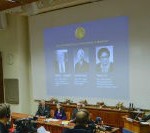February 2019
The technopolitics of climate change: climate models, geopolitics, and governmentality, published in HCS-Manguinhos (vol.24 no.4 Oct./Dec. 2017), by Postdoctoral fellow at Universidade Federal de São Paulo, examines the climate modeling of Instituto Nacional de Pesquisas Espaciais (INPE) and its implications to politics.
Climate models use quantitative methods to simulate the interactions of the important drivers of climate, including atmosphere and oceans. They are used for a variety of purposes from study of the dynamics of the climate system to projections of future climate.
According to the article, the Intergovernmental Panel on Climate Change (IPCC – United Nations) plays out in line with the organizational principle of a “balanced geographic representation,” that is, the idea of including members from various countries on the panel and assessing scientific output from member countries for use in reports. While more researchers from developing nations have been incorporated into the institutional framework of the IPCC during the course of drafting these reports.
Based on an empirical study of climate modeling at INPE, the article explores how climate modeling represents a pragmatic government approach within the international framework of global climate knowledge production.
In examining the political dimension of processes of climate knowledge production, the article identified initiatives that have been taken by scientific groups linked to the Brazilian State and that have the intention of moving beyond inequalities in the international science system.
Read about climate in Manguinhos:
Miguel, Jean Carlos Hochsprung. The technopolitics of climate change: climate models, geopolitics, and governmentality. Hist. cienc. saude-Manguinhos, Out 2017, vol.24, no.4.
Caponi, Sandra. Clima, cerebro y degeneración en Cabanis. Hist. cienc. saude-Manguinhos, Dic 2009, vol.16, no.4, p.961-979. ISSN 0104-5970
Carneiro, Celso Dal Ré and Toniolo, João Cláudio. A Terra ‘quente’ na imprensa: confiabilidade de notícias sobre aquecimento global. Hist. cienc. saude-Manguinhos, Jun 2012, vol.19, no.2, p.369-390. ISSN 0104-5970








